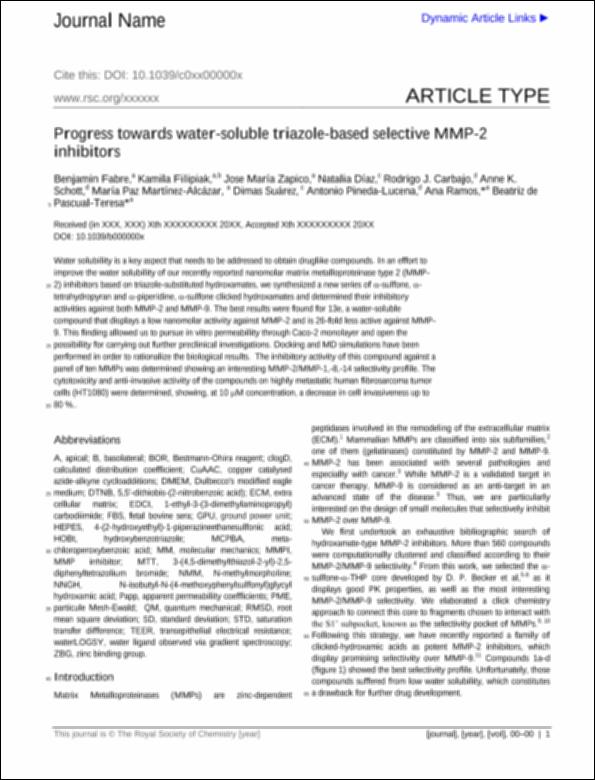Por favor, use este identificador para citar o enlazar este ítem:
http://hdl.handle.net/10637/7721Progress towards water-soluble triazole-based selective MMP-2 inhibitors.
| Título : | Progress towards water-soluble triazole-based selective MMP-2 inhibitors. |
| Autor : | Ramos González, Ana Martínez Alcázar, María Paz Zapico Rodríguez, José María Pascual-Teresa Fernández, Beatriz de Fabre, Benjamin Filipiak, Kamila |
| Materias: | Metaloproteínas; Análisis |
| Resumen : | Water solubility is a key aspect that needs to be addressed to obtain druglike compounds. In an effort to improve the water solubility of our recently reported nanomolar matrix metalloproteinase type 2 (MMP10 2) inhibitors based on triazole-substituted hydroxamates, we synthesized a new series of -sulfone, - tetrahydropyran and -piperidine, -sulfone clicked hydroxamates and determined their inhibitory activities against both MMP-2 and MMP-9. The best results were found for 13e, a water-soluble compound that displays a low nanomolar activity against MMP-2 and is 26-fold less active against MMP9. This finding allowed us to pursue in vitro permeability through Caco-2 monolayer and open the 15 possibility for carrying out further preclinical investigations. Docking and MD simulations have been performed in order to rationalize the biological results. The inhibitory activity of this compound against a panel of ten MMPs was determined showing an interesting MMP-2/MMP-1,-8,-14 selectivity profile. The cytotoxicity and anti-invasive activity of the compounds on highly metastatic human fibrosarcoma tumor cells (HT1080) were determined, showing, at 10 M concentration, a decrease in cell invasiveness up to 20 80 %. |
| Descripción : | En: Organic and Biomolecular Chemistry. EISSN. 1477-0539. 2013, 11, 6623-6641, doi: 10.1039/c3ob41046c |
| URI : | http://hdl.handle.net/10637/7721 |
| Derechos: | http://creativecommons.org/licenses/by-nc-nd/4.0/deed.es |
| Fecha de publicación : | 26-sep-2013 |
| Centro : | Universidad San Pablo-CEU |
| Aparece en las colecciones: | Facultad de Farmacia |
Los ítems de DSpace están protegidos por copyright, con todos los derechos reservados, a menos que se indique lo contrario.


